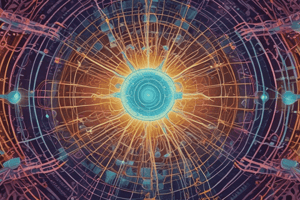Podcast
Questions and Answers
Which type of summation occurs when multiple neurons send EPSPs to exceed the threshold?
Which type of summation occurs when multiple neurons send EPSPs to exceed the threshold?
- Temporal summation
- EPSPs
- IPSPs
- Spatial summation (correct)
Which of the following decreases the likelihood of generating an action potential?
Which of the following decreases the likelihood of generating an action potential?
- Temporal summation
- Spatial summation
- IPSPs (correct)
- EPSPs
Which type of communication between neurons involves the release of neurotransmitters into the synaptic cleft?
Which type of communication between neurons involves the release of neurotransmitters into the synaptic cleft?
- Chemical communication (correct)
- Synapses
- Gap junctions
- Electrical communication
Where do synapses occur between in neurons?
Where do synapses occur between in neurons?
What allows ions to move directly between glial cells?
What allows ions to move directly between glial cells?
Which of the following is an example of a psychoactive drug?
Which of the following is an example of a psychoactive drug?
What is the role of agonists in neuron communication?
What is the role of agonists in neuron communication?
What is the main function of receptors in neuron communication?
What is the main function of receptors in neuron communication?
How do psychoactive drugs affect the process of receptor binding and neuron communication?
How do psychoactive drugs affect the process of receptor binding and neuron communication?
What is neuroplasticity?
What is neuroplasticity?
Which of the following is responsible for maintaining the resting membrane potential of neurons?
Which of the following is responsible for maintaining the resting membrane potential of neurons?
What is the function of myelin sheaths in neural communication?
What is the function of myelin sheaths in neural communication?
Which type of matter consists of non-myelinated neurons?
Which type of matter consists of non-myelinated neurons?
What is the role of voltage gated channels during an action potential?
What is the role of voltage gated channels during an action potential?
What is the function of neurotransmitters in neural communication?
What is the function of neurotransmitters in neural communication?
Flashcards are hidden until you start studying
Study Notes
Neurophysiology, Neurochemistry, Visualizing Neural Activity, Resting Membrane Potential, Action Potential, Sodium-Potassium Pumps, Voltage Gated Channels, Refractory Period, Myelin and Saltatory Conduction, Oligodendrocytes, Grey Matter and White Matter, Postsynaptic Potentials, Neurochemistry/Neuropharmacology, Neural Integration
- Neurophysiology studies the generation of electrical signals called action potentials
- Resting membrane potential is the baseline physiological condition of neurons, maintained by the phospholipid bilayer and the movement of ions
- Sodium, potassium, calcium, and chloride ions play important roles in neurophysiology
- Neurotransmitters are released into the synapse to pass signals from one neuron to the next
- Visualizing neural activity is challenging but can be done using brain scans, PET imaging, and calcium imaging
- Resting potential of a neuron is -70 millivolts, maintained by the movement of potassium ions in and out of the cell
- Action potentials begin at the axon hillock when the threshold value is reached, causing depolarization
- Sodium-potassium pumps actively transport sodium out and potassium into the cell, requiring ATP
- Voltage gated channels open and close to allow the flow of sodium and potassium ions during an action potential
- The refractory period follows an action potential, during which the neuron cannot fire again
- Myelin sheaths, made up of oligodendrocytes, insulate neurons and increase the efficiency of neural communication through saltatory conduction
- Grey matter consists of non-myelinated neurons, while white matter consists of myelinated neurons
- Postsynaptic potentials, either excitatory or inhibitory, determine whether a neuron will fire an action potential
- Neural integration involves the integration of multiple inputs from presynaptic neurons to determine whether an action potential will be generated
Studying That Suits You
Use AI to generate personalized quizzes and flashcards to suit your learning preferences.




